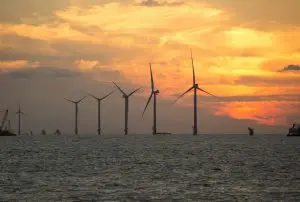As COP26 approaches, Brevia will be tracking the latest milestones in the UK’s preparations for the upcoming climate conference. This week, the Government has continued to face a series of setbacks ahead of the COP26 Summit. Most notably, the Prime Minister is facing pressure both from the Treasury and from within his backbenches around the cost of net zero, whilst also having to face the possibility that the summit will need to take place in some form of ‘hybrid’ mode.
A hybrid summit?
Speaking to BBC Scotland earlier in the week, the former head of the UN’s climate change agency, and key engineer of the Paris climate agreement, Christiana Figuers, suggested that the COP26 summit should be held as a hybrid event.[1]
Ms Figueres warned that it was unlikely to be possible to have the expected 25,000 people in wider attendance for the event, as originally planned. As such, the ex-UN official felt that a ‘sweet-spot’ could be met, with some negotiations taking place online, and others in person. She explained that this would allow for successful and efficient negotiations, without compromising on health measures.
The Government has long-faced difficulties over the structure of the upcoming summit, with Greta Thunberg having previously raised concerns over unequal access to vaccines and the impact this would have on attendance at COP26.[2]The Government has since said that it will work with UN channels to ensure all delegates are able to access vaccines in the run up to the event.
However, on a more positive note for the Government, Ms Figueres praised the climate leadership of the UK, as well as the Scottish Government’s work towards tackling climate change.
A battle on two fronts
Articles on the cost of net zero, specifically on the cost to decarbonising heat in homes, have dominated in the news over the past few weeks. Much of the debate and speculation has focused on the Government’s proposed policy to ban the installation of gas boilers, The Government was initially expected to announce a ban from 2035, however it is understood that this is likely to be pushed back to 2040, following concerns raised by the Treasury over how much this would cost consumers.[3]
Aside from roadblocks from the Treasury, the Prime Minister is also facing a second battle with a number of his backbench MPs, many of whom have grown more vocal in their criticism of the costs associated with net zero. Several reports in the recent weeks have suggested that a group of MPs are setting up a new backbench group with the aim of scrutinising the cost of the Government’s green policies.[4] It is expected that the group will be chaired by Craig Mackinlay, who also chairs the APPG on Fair Fuel for UK Motorists and UK Hauliers. The APPG has been vocal in its critic of the Government’s forthcoming ban on new petrol and diesel cars, and recently put out a report suggesting that the Government’s intended roll out of EVs would lead to increasing blackouts.[5]
Communication difficulties
Alok Sharma took on the role of COP26 President full-time in January in order to enable him to focus his attention and efforts on the landmark summit. However, with less than 100 days to go, concerns have been raised over the strength of Government messaging around COP26.[6]
The Government recently attempted to step up its messaging on COP26, with its campaign titled ‘One Step Greener’, outlining small steps individuals can take to tackle climate change. Unfortunately for central Government, some of the suggestions, such as freezing bread, were not met with particular enthusiasm.[7]
Added to this, the delay in a number of key green publications (e.g., Hydrogen Strategy, Heat and Buildings and Net Zero), have resulted in confusion and uncertainty over the Government’s position on a number of central net zero policies. The Government needs to show effective communication and leadership, starting with the publication of the remaining key net zero policies, in order to secure success as COP26 President.
BREVIA CONSULTING PROVIDES STRAIGHTFORWARD POLITICAL AND COMMUNICATIONS SUPPORT TO BUSINESSES AND ORGANISATIONS
Discover how Brevia can help you and your organisation by contacting the Brevia Energy Team on 020 7091 1650 or emailing us at: contact@brevia.co.uk
Notes
[1] Marc Horne, ’Make climate conference Cop26 partly online, says Paris accord architect’, The Times, 4 August 2021, Link
[2], Agence France-Presse ‘Greta Thunberg says she will not attend Cop26 climate summit’, The Guardian, 9 April 2021, link
[3] Emma Gatten, ‘Green homes plan to banish gas boilers goes on the back burner’, The Independent, 15 July 2021, Link
[4] Anushka Asthana, ‘Tory backbenchers prepare to fight cost of net zero greenhouse gas emissions’, ITV News, 31 July 2021, Link
[5] APPG on Fair Fuel for UK Motorists and UK Hauliers, ‘Fair Fuel APPG for UK Motorists and UK Hauliers’, 5 August 2021, Link
[6] Tim Shipman, ‘Boris Johnson’s green dream is already turning toxic’, The Sunday Times, 1 August 2021, Link
[7] Harry Cockburn, ‘Anger as Johnson’s Cop26 spokeswoman Allegra Stratton suggests ‘not rinsing dishes’ to tackle climate crisis’, The Independent 28 July 2021, Link




